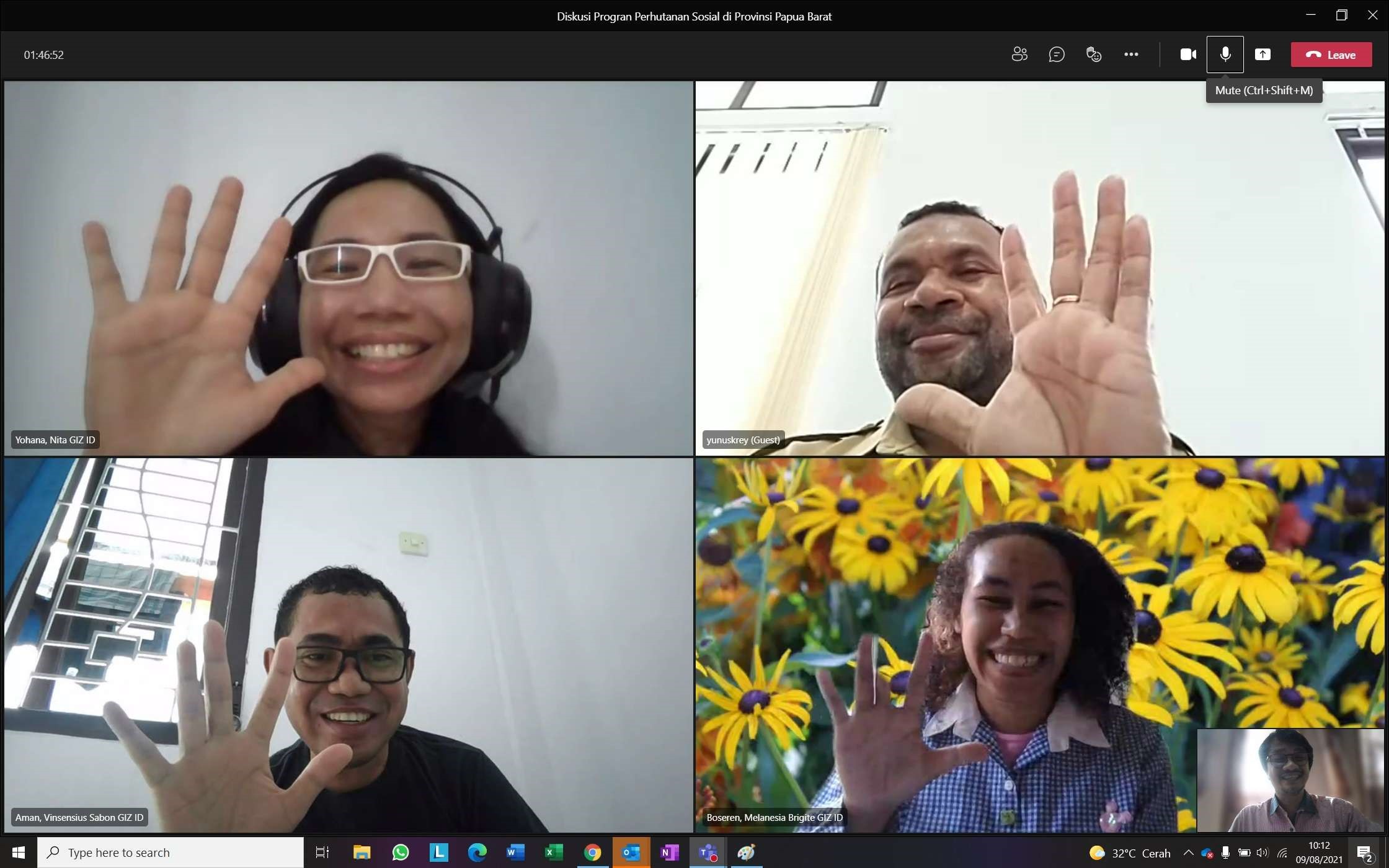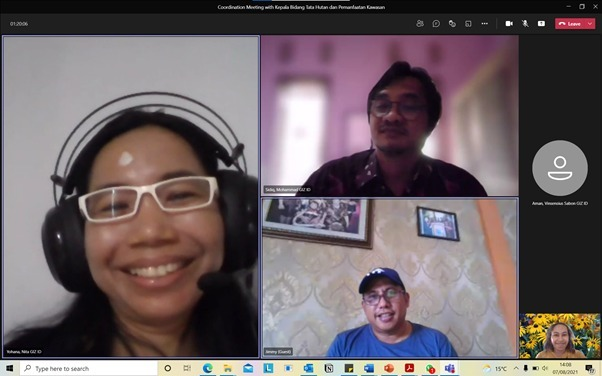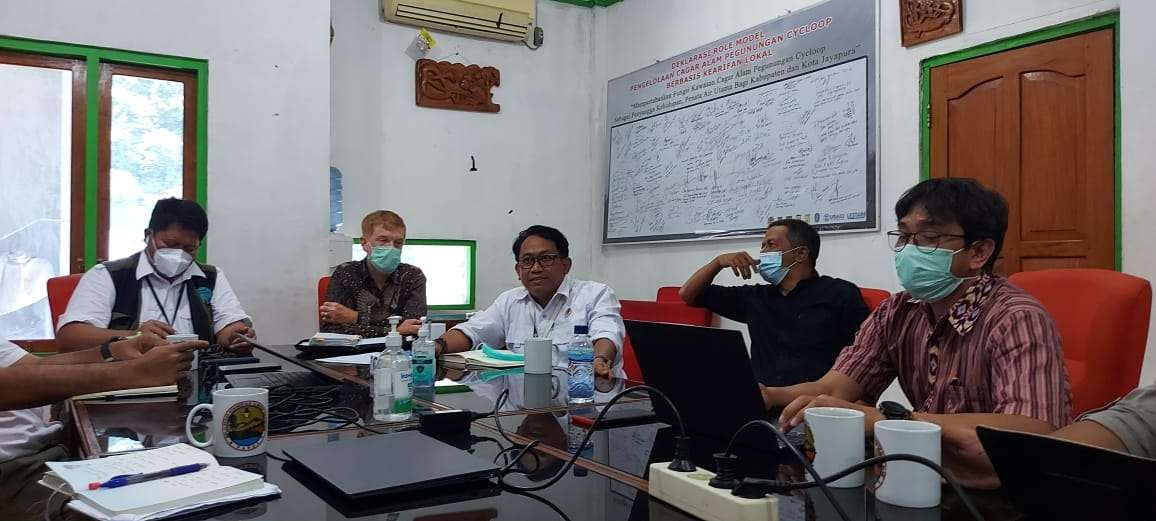FORCLIME
Forests and Climate Change ProgrammeTechnical Cooperation (TC Module)

Select your language

In an effort to coordinate with the Forestry Service of West Papua Province, the FORCLIME team operating in West Papua organized an online meeting on 9 August 2021. The meeting was chaired by the Head of Forest Management and Social Forestry for the West Papua Forestry Service, Mr. Yunus Krey, S. Hut., M.Si, and addressed the development of social forestry within the province, as well as FORCLIME support for the West Papua Province Social Forestry Working Group.
FORCLIME’s West Papuan personnel were warmly welcomed by Mr. Krey, who went on to state that, “FORCLIME’s involvement is expected to be implemented in the medium to long term and will address challenges in social forestry management that manifest after permits have been obtained, as well as challenges relating to facilitation and market access opportunities.”
During the meeting, FORCLIME stated its potential support for the Social Forestry Working Group, which will address the following areas:
1. Support for the development of a Social Forestry roadmap;
2. Support for dialogue on Social Forestry programmes and the strengthening of the role of tradi-tional communities in relation to forest management and economic development;
3. Support for the empowerment of community groups within a pilot village in FORCLIME’s working area;
4. Support for the development and utilization of non-timber forest products.
For more information, please contact:
Nita Yohana, Adviser for sustainable forest management and Coordinator for West Papua Province
Melanesia Brigite Boseren, Junior adviser for rural livelihood, forest management and conservation
Mohammad Sidiq, Strategic area manager for sustainable forest management and Coordinator for Papua and West Papua Provinces

With the goal of supporting the West Papua Provincial Forestry Service in the redesign of the forest management unit (KPH) area, the FORCLIME Team in West Papua organized a coordination meeting with the Head of the Forest Management and Area Utilization for the West Papua Province Forestry Service, Mr. Jimmy W. Susanto, on 7 August 2021. The online meeting also discussed FORCLIME's support for facilitating an audience with the Director-General of Planning and Environmental Governance at the Ministry of Environment and Forestry (KLHK) in relation to the redesign concept for the West Papua KPH area.
The meeting also discussed potential FORCLIME support in relation to FMU activities, including:
1. Capacity-building among KPH staff and Forest Farmer Groups in FORCLIME pilot villages through coaching clinic programmes, training sessions and mentoring.
2. Technical support for the revision or adjustment of the KPH’s forest management plan (RPHJP) in accordance with regulations issued by the KLHK.
3. Support related to the business activities of the facilitated Forest Farmers Group in the KPH area.
For more information, please contact:
Nita Yohana, Adviser for sustainable forest management and Coordinator of West Papua Province
Melanesia Brigite Boseren, Junior adviser for rural livelihood, forest management and conservation
Mohammad Sidiq, Strategic area manager for sustainable forest management and Coordinator for Papua and West Papua Provinces

Following up on a previous informal discussion, FORCLIME and the Papua Natural Resources Conservation Center (BBKSDA Papua) held a coordination meeting on 23 June 2021 in Jayapura, Papua Province. The meeting was chaired by the Head of BBKSDA Papua, Mr Edward Sembiring, S.Hut., M.Sc., and aimed to synergize conservation partnership activities within the BBKSDA Papua area. Currently, some 14 conservation partnership groups have been formed within the KPHK Cyloop – Youtefa area. These groups have been approved by the Head of Village and their activities are being carried out in accordance with community potential. Conservation partnership activities are expected to bring significant changes to the community's economic condition.
During the discussion, two groups were proposed for the receiving of FORCLIME support, specifically:
- The village in Tablasupa for ecotourism activities and the production of imitation Cenderawasih ornaments to be used as PON XX souvenirs.
- A group in Dosay for orchid development. This group also has potential in terms of the development of honeybee cultivation.
In addition, the coordination meeting also addressed the various target villages that will be identified as FORCLIME 4.0 pilot villages. These designations are to be followed up by field visits.
“BBKSDA is pleased to work with FORCLIME and we can synergize with each other in order to open up opportunities for BBKSDA to cooperate with various parties. This collaboration is expected to result in community independence, meaning that communities will be able to produce without harming the forest. Prosperous Community, Sustainable Forest”, stated Mr Edward Sembiring, Head of BBKSDA Papua.
For more information, please contact:
Theodora F. Resubun, Advisor for Sustainable Forest Management and Coordinator for Papua Province
Mohammad Sidiq, Strategic Area Manager for Sustainable Forest Management and Coordinator for Papua and West Papua Provinces
 |
Supported By: |
  |